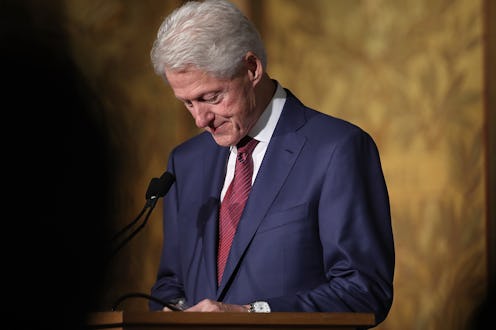News
Kirsten Gillibrand Says Monica Lewinsky Should've Been The End Of Bill Clinton

In the post-Weinstein era, it seems no powerful man's sexual misconduct remains off-limits for discussion. On Thursday, Sen. Kirsten Gillibrand said former President Bill Clinton's affair with Monica Lewinsky, then a White House intern, should have forced him to resign at the time. Gillibrand was asked directly by a reporter for the New York Times about whether he should have stepped down, and she responded by saying, “Yes, I think that is the appropriate response.”
In her further discussion of the issue with the Times, Gillibrand suggested she believes President Clinton occupied the White House in a different era — but was clear that a boss having a sexual relationship with an intern would be viewed as a fireable offense today.
“Things have changed today, and I think under those circumstances there should be a very different reaction,” she said. “And I think in light of this conversation, we should have a very different conversation about President Trump, and a very different conversation about allegations against him.”
Gillibrand has spoken out loudly about sexual harassment in the workplace, particularly now that other women in Congress and their staffers have come forward with public statements about just how much workplace sexual harassment happens in the halls of the U.S. Capitol. She and Rep. Jackie Speier have introduced a bill in both houses dubbed the ME TOO Congress Act, which aims to combat sexual harassment in the nation's legislature.
Her comments about former President Clinton highlight how far the issue has progressed, even in just the past year. Gillibrand holds the U.S. Senate seat that Hillary Clinton once occupied and is very close to the Clintons; Bill Clinton even has campaigned with her. She was a high-profile and vocal supporter of Hillary Clinton when she ran for president last year. Now, Gillibrand is the highest-profile Democrat who has claimed that if President Clinton were to have his affair today, he'd be pressured into resigning.
The wave that's sweeping prominent men out of power after sexual harassment or assault allegations, which started in Hollywood, has now flooded the political world. It gained steam with Alabama Senate candidate Roy Moore, who's accused of sexually assaulting a woman when she was 14 years old, and most recently exposed Sen. Al Franken. At first, most Republicans were wary of condemning Moore and distancing themselves from him, but now congressional Republicans are more or less united in turning their backs on him after several additional allegations surfaced of him having dated, pursued, and sexually assaulted minors. Moore has strongly denied all of the allegations against him.
After radio host Leeann Tweeden said that Franken had groped and inappropriately kissed her while on a United Services Organization tour in 2006, Franken issued an apology, but he has not said anything about stepping down — nor have many of his Democratic colleagues called on him to do so.
“I think in light of this conversation, we should have a very different conversation about President Trump, and a very different conversation about allegations against him.”
This makes it all the more jarring that Gillibrand is speaking out now about Bill Clinton, even if she's referring to an affair that happened decades ago. This past situation certainly does have ties to the present moment, however, considering the allegations of sexual harassment from approximately two dozen women against current President Trump, which he has vigorously denied. Those accusations did not stop him from getting elected; the crass Access Hollywood tape that showed Trump bragging about sexual assault, which hit the headlines only weeks before the election, didn't sway its results, either. So while it seems unlikely that Gillibrand's words will have a major effect on how Republicans in Congress approach the allegations that have been leveled against President Trump, she has started a conversation.